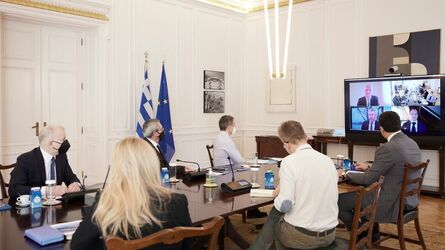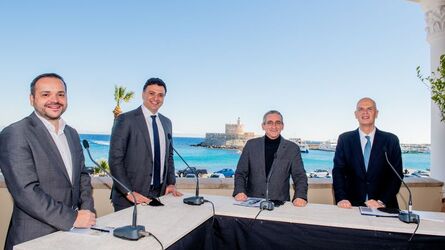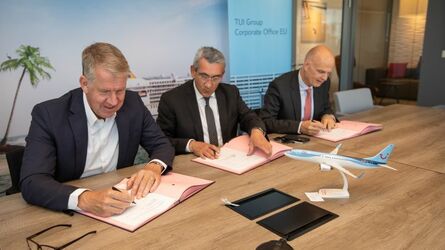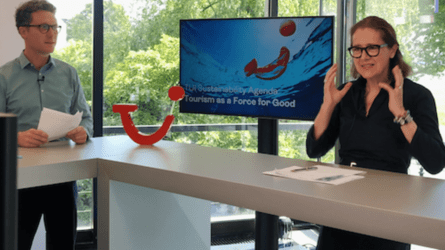The tourism sector, like many other economic sectors, is facing a decade of sustainable transformation. As the world's leading integrated tourism group, TUI has a special responsibility in this regard, which the travel group consistently takes on. Company representatives from various business areas of the TUI Group discussed this with members of the German parliament and the “Hamburgische Bürgerschaft”on 25 August 2022. On board the Mein Schiff 1, anchored in Hamburg, the politicians were also able to gain their own impression of TUI Cruises' comprehensive environmental and climate protection measures during a so-called environmental tour.
TUI Group Sustainability Dialogue: Members of Parliament on Mein Schiff 1
CO2 reduction instead of offsetting - TUI's ambitious environmental goals
Thomas Ellerbeck, Member of the Group Executive Committee of TUI Group, gave first insights into the new sustainability agenda. Two premises are essential here. Firstly, TUI wants to truly reduce CO2 emissions instead of offsetting them via compensatory measures. By 2050 it wants to be a net zero company. Secondly, TUI will proceed in a transparent and science-based manner. The tourism group, therefore, has submitted "emissions roadmaps" for the airlines, cruises and hotels business segments to the NGO Science Based Targets Initiative (SBTi), which among others is supported by the WWF and the UN Global Compact. For each of the three business segments, detailed investigations were carried out and action plans developed to realise significant reductions in emissions by 2030. Thomas Ellerbeck: "This ensures that our self-defined emission reduction targets for 2030 are based on the latest findings of climate science and are in line with the goals of the Paris Climate Agreement." He also presented recently launched lighthouse projects such as the "Destination Co-Lab Rhodes". In cooperation with the Greek government and the government of the South Aegean region as well as local partners, the TUI Group is developing the island into a sustainable destination. At the launch of the Co-Lab at the beginning of this year, the project was personally presented to the Greek Prime Minister Kyriakos Mitsotakis.
First climate-neutral cruises starting in 2030
Wybcke Meier, CEO of TUI Cruises, discussed TUI Cruises' commitment to sustainability, in which environmental and climate protection plays a key role: TUI Cruises has set itself the goal of operating its entire fleet (Mein Schiff & Hapag-Lloyd Cruises) in a climate-neutral manner no later than 2050. By 2030, TUI Cruises already wants to offer the first climate-neutral cruises and implement significant reductions in emissions. With the Mein Schiff fleet and the luxury and expedition liners of Hapag-Lloyd Cruises, TUI Cruises already operates the most modern and environmentally friendly fleet worldwide. For future newbuilds for the Mein Schiff fleet, TUI Cruises is focusing on the use of lower-emission fuels or liquid gas, prospectively BIO-LNG. One of the ships will be built in a way that will enable it to runon methanol, or green methanol. These are all important investments in the future to drive decarbonisation forward, Meier said. Power supply in the ports is also an issue: All ships will be able to use shore power in the future, and some ships are already doing so today, if available. The challenge: With the exception of some German and northern European ports, the shore-side connections are lacking. In addition, green power concepts are needed to prevent emissions from being shifted to other areas. This is where politics and port operators are demanded. During a behind-the-scenes tour, Lucienne Damm, Head of Sustainability at TUI Cruises, explained how environmental and climate protection is being implemented on board the Mein Schiff 1. A key role is played by the environmental officers. They are always on board, monitoring compliance with applicable regulations and high standards in the areas of energy efficiency, handling waste and waste water, as well as training the crew. Topics include the reduction of food waste and recycling.
Investment in modern aircraft fleet
Air transport is responsible for around 80 percent of TUI Group's CO2 emissions. The consistent reduction of CO2 emissions is therefore a core component of TUI's new sustainability agenda. The use of new and lower-emission aircraft is essential in this respect. Marco Ciomperlik, Chief Airline Officer of TUI Group, underlined that, thanks to multi-million investments, TUI was already leading in CO2 emission intensity before the Corona pandemic. A success that is regularly confirmed by the independent NGO atmosfair in its Airline Index: TUIfly and TUI Airlines repeatedly rank among the world's top 125 airlines due to their efficiency. "We are continuing to renew our fleet with efficient Boeing 737 MAX aircraft even after the pandemic," says Ciomperlik. They reduce fuel consumption by 14 percent compared to similar aircraft, and noise emissions are lowered by 40 percent. One challenge for the long term remains the availability of sustainable aviation fuels (SAF). Negotiations are ongoing with current fuel suppliers and new SAF providers.




 Austria
Austria
















